Mental Health Report: Psychosis, Depression, and Mania with Treatments
VerifiedAdded on 2023/04/23
|20
|6206
|85
Report
AI Summary
This report provides a comprehensive overview of mental illnesses, specifically focusing on psychosis, depression, and mania. It delves into the symptoms associated with each condition, exploring the diverse ways these illnesses manifest in individuals. The report meticulously examines the potential causes of these mental health disorders, encompassing genetic factors, trauma, substance use, and other underlying medical conditions. Furthermore, it investigates how principles of recovery can be applied to assist individuals seeking help, emphasizing the importance of understanding and implementing effective treatment strategies. The report also outlines the various types of mental health care providers, distinguishing between primary, secondary, and tertiary levels of care, and highlights the legal implications relevant to mental health treatment and patient rights. This assignment aims to provide a detailed understanding of these complex mental health conditions and the multifaceted approaches to their management.
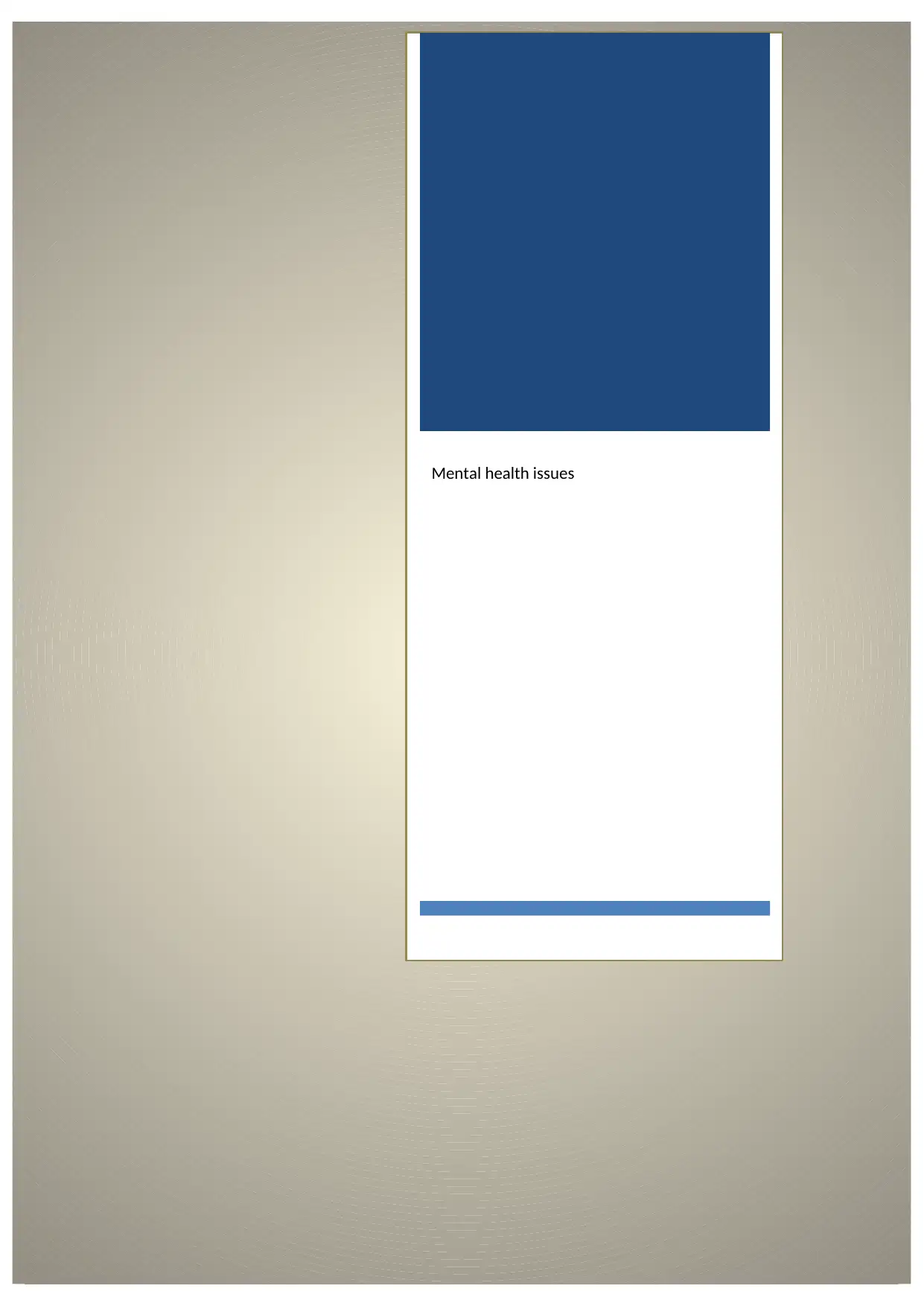
Mental health issues
Paraphrase This Document
Need a fresh take? Get an instant paraphrase of this document with our AI Paraphraser
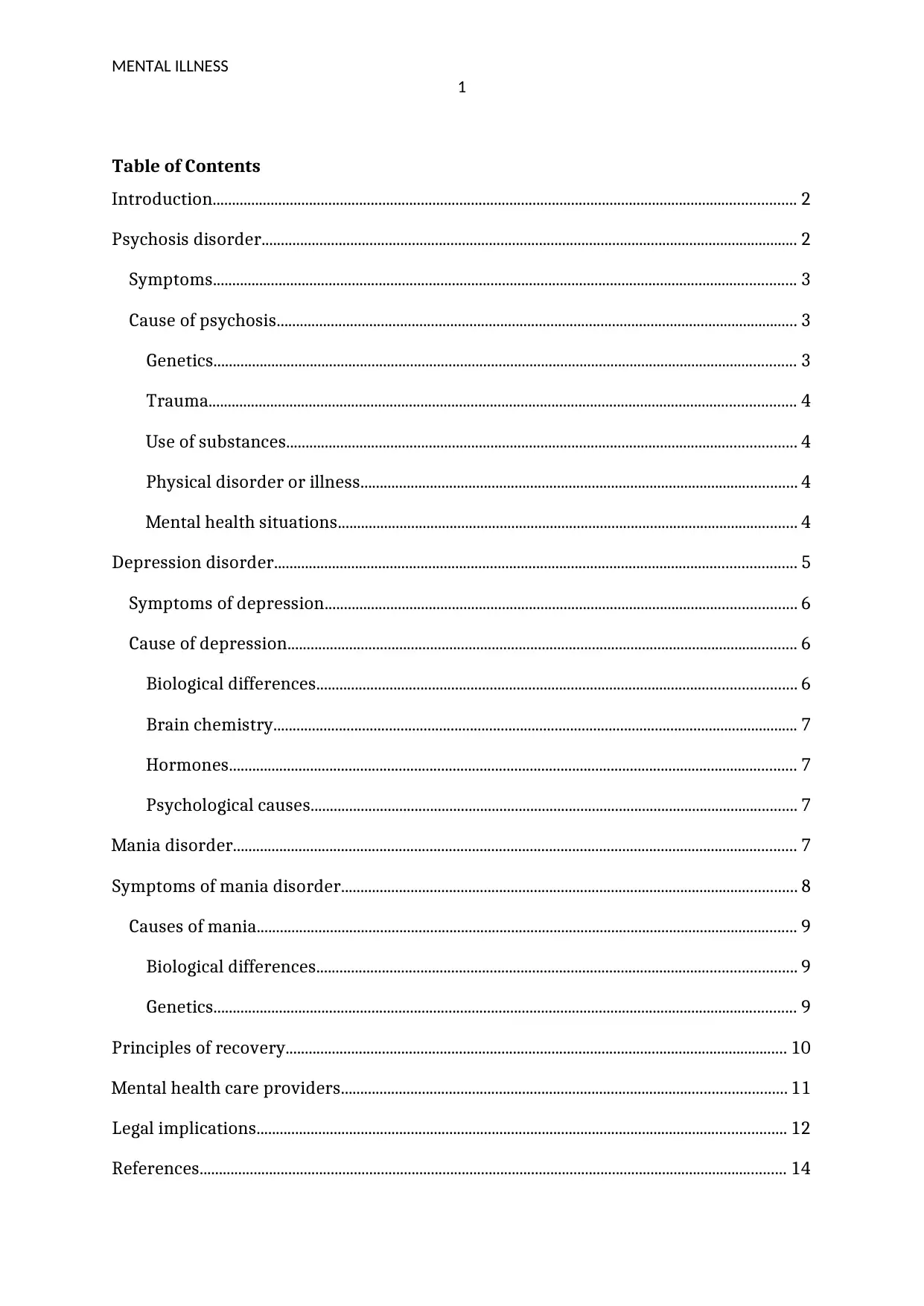
MENTAL ILLNESS
1
Table of Contents
Introduction....................................................................................................................................................... 2
Psychosis disorder........................................................................................................................................... 2
Symptoms....................................................................................................................................................... 3
Cause of psychosis....................................................................................................................................... 3
Genetics....................................................................................................................................................... 3
Trauma........................................................................................................................................................ 4
Use of substances.................................................................................................................................... 4
Physical disorder or illness................................................................................................................. 4
Mental health situations....................................................................................................................... 4
Depression disorder....................................................................................................................................... 5
Symptoms of depression.......................................................................................................................... 6
Cause of depression.................................................................................................................................... 6
Biological differences............................................................................................................................ 6
Brain chemistry........................................................................................................................................ 7
Hormones................................................................................................................................................... 7
Psychological causes.............................................................................................................................. 7
Mania disorder.................................................................................................................................................. 7
Symptoms of mania disorder...................................................................................................................... 8
Causes of mania............................................................................................................................................ 9
Biological differences............................................................................................................................ 9
Genetics....................................................................................................................................................... 9
Principles of recovery.................................................................................................................................. 10
Mental health care providers................................................................................................................... 11
Legal implications......................................................................................................................................... 12
References........................................................................................................................................................ 14
1
Table of Contents
Introduction....................................................................................................................................................... 2
Psychosis disorder........................................................................................................................................... 2
Symptoms....................................................................................................................................................... 3
Cause of psychosis....................................................................................................................................... 3
Genetics....................................................................................................................................................... 3
Trauma........................................................................................................................................................ 4
Use of substances.................................................................................................................................... 4
Physical disorder or illness................................................................................................................. 4
Mental health situations....................................................................................................................... 4
Depression disorder....................................................................................................................................... 5
Symptoms of depression.......................................................................................................................... 6
Cause of depression.................................................................................................................................... 6
Biological differences............................................................................................................................ 6
Brain chemistry........................................................................................................................................ 7
Hormones................................................................................................................................................... 7
Psychological causes.............................................................................................................................. 7
Mania disorder.................................................................................................................................................. 7
Symptoms of mania disorder...................................................................................................................... 8
Causes of mania............................................................................................................................................ 9
Biological differences............................................................................................................................ 9
Genetics....................................................................................................................................................... 9
Principles of recovery.................................................................................................................................. 10
Mental health care providers................................................................................................................... 11
Legal implications......................................................................................................................................... 12
References........................................................................................................................................................ 14

MENTAL ILLNESS
2
2
⊘ This is a preview!⊘
Do you want full access?
Subscribe today to unlock all pages.

Trusted by 1+ million students worldwide
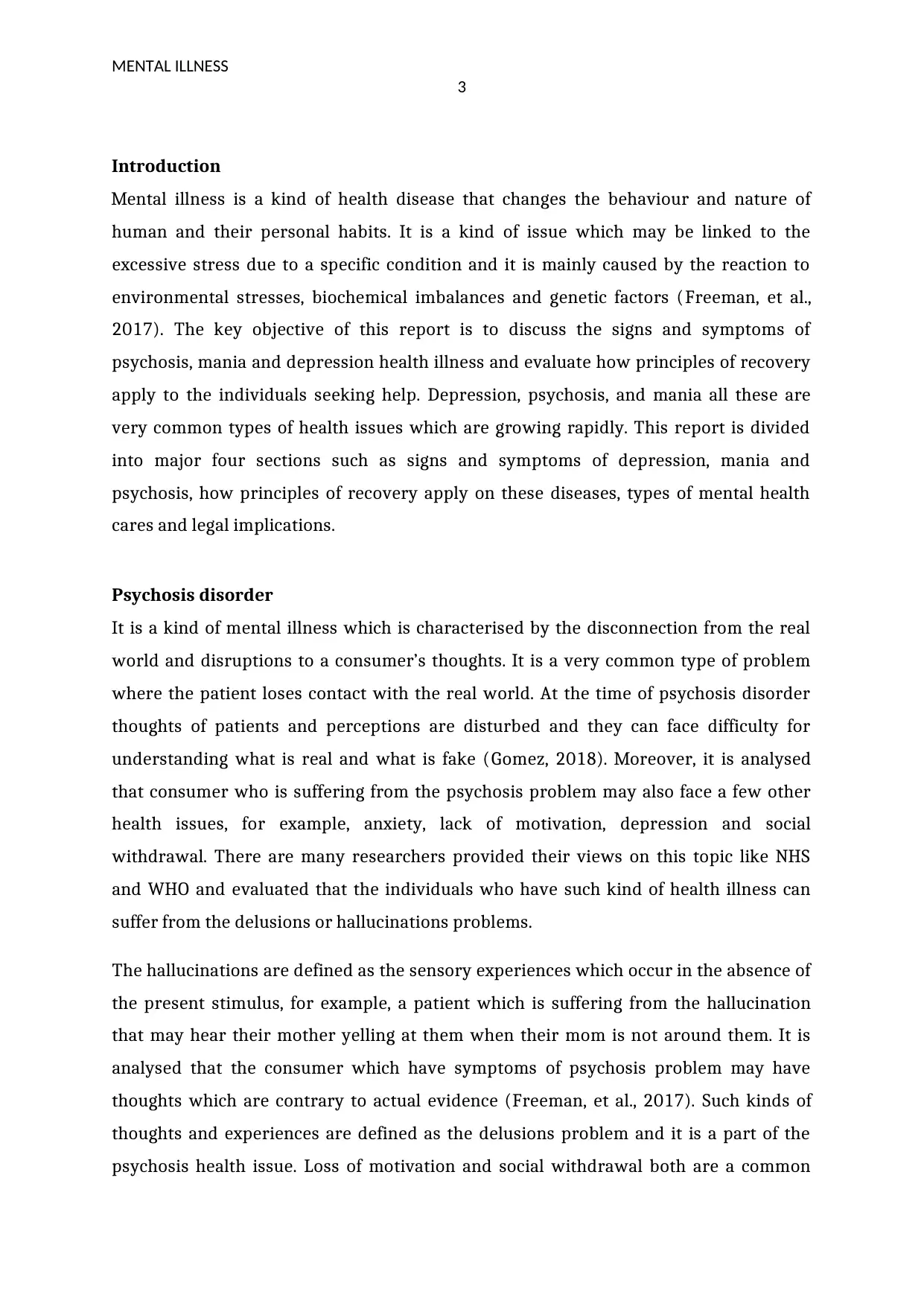
MENTAL ILLNESS
3
Introduction
Mental illness is a kind of health disease that changes the behaviour and nature of
human and their personal habits. It is a kind of issue which may be linked to the
excessive stress due to a specific condition and it is mainly caused by the reaction to
environmental stresses, biochemical imbalances and genetic factors (Freeman, et al.,
2017). The key objective of this report is to discuss the signs and symptoms of
psychosis, mania and depression health illness and evaluate how principles of recovery
apply to the individuals seeking help. Depression, psychosis, and mania all these are
very common types of health issues which are growing rapidly. This report is divided
into major four sections such as signs and symptoms of depression, mania and
psychosis, how principles of recovery apply on these diseases, types of mental health
cares and legal implications.
Psychosis disorder
It is a kind of mental illness which is characterised by the disconnection from the real
world and disruptions to a consumer’s thoughts. It is a very common type of problem
where the patient loses contact with the real world. At the time of psychosis disorder
thoughts of patients and perceptions are disturbed and they can face difficulty for
understanding what is real and what is fake (Gomez, 2018). Moreover, it is analysed
that consumer who is suffering from the psychosis problem may also face a few other
health issues, for example, anxiety, lack of motivation, depression and social
withdrawal. There are many researchers provided their views on this topic like NHS
and WHO and evaluated that the individuals who have such kind of health illness can
suffer from the delusions or hallucinations problems.
The hallucinations are defined as the sensory experiences which occur in the absence of
the present stimulus, for example, a patient which is suffering from the hallucination
that may hear their mother yelling at them when their mom is not around them. It is
analysed that the consumer which have symptoms of psychosis problem may have
thoughts which are contrary to actual evidence (Freeman, et al., 2017). Such kinds of
thoughts and experiences are defined as the delusions problem and it is a part of the
psychosis health issue. Loss of motivation and social withdrawal both are a common
3
Introduction
Mental illness is a kind of health disease that changes the behaviour and nature of
human and their personal habits. It is a kind of issue which may be linked to the
excessive stress due to a specific condition and it is mainly caused by the reaction to
environmental stresses, biochemical imbalances and genetic factors (Freeman, et al.,
2017). The key objective of this report is to discuss the signs and symptoms of
psychosis, mania and depression health illness and evaluate how principles of recovery
apply to the individuals seeking help. Depression, psychosis, and mania all these are
very common types of health issues which are growing rapidly. This report is divided
into major four sections such as signs and symptoms of depression, mania and
psychosis, how principles of recovery apply on these diseases, types of mental health
cares and legal implications.
Psychosis disorder
It is a kind of mental illness which is characterised by the disconnection from the real
world and disruptions to a consumer’s thoughts. It is a very common type of problem
where the patient loses contact with the real world. At the time of psychosis disorder
thoughts of patients and perceptions are disturbed and they can face difficulty for
understanding what is real and what is fake (Gomez, 2018). Moreover, it is analysed
that consumer who is suffering from the psychosis problem may also face a few other
health issues, for example, anxiety, lack of motivation, depression and social
withdrawal. There are many researchers provided their views on this topic like NHS
and WHO and evaluated that the individuals who have such kind of health illness can
suffer from the delusions or hallucinations problems.
The hallucinations are defined as the sensory experiences which occur in the absence of
the present stimulus, for example, a patient which is suffering from the hallucination
that may hear their mother yelling at them when their mom is not around them. It is
analysed that the consumer which have symptoms of psychosis problem may have
thoughts which are contrary to actual evidence (Freeman, et al., 2017). Such kinds of
thoughts and experiences are defined as the delusions problem and it is a part of the
psychosis health issue. Loss of motivation and social withdrawal both are a common
Paraphrase This Document
Need a fresh take? Get an instant paraphrase of this document with our AI Paraphraser
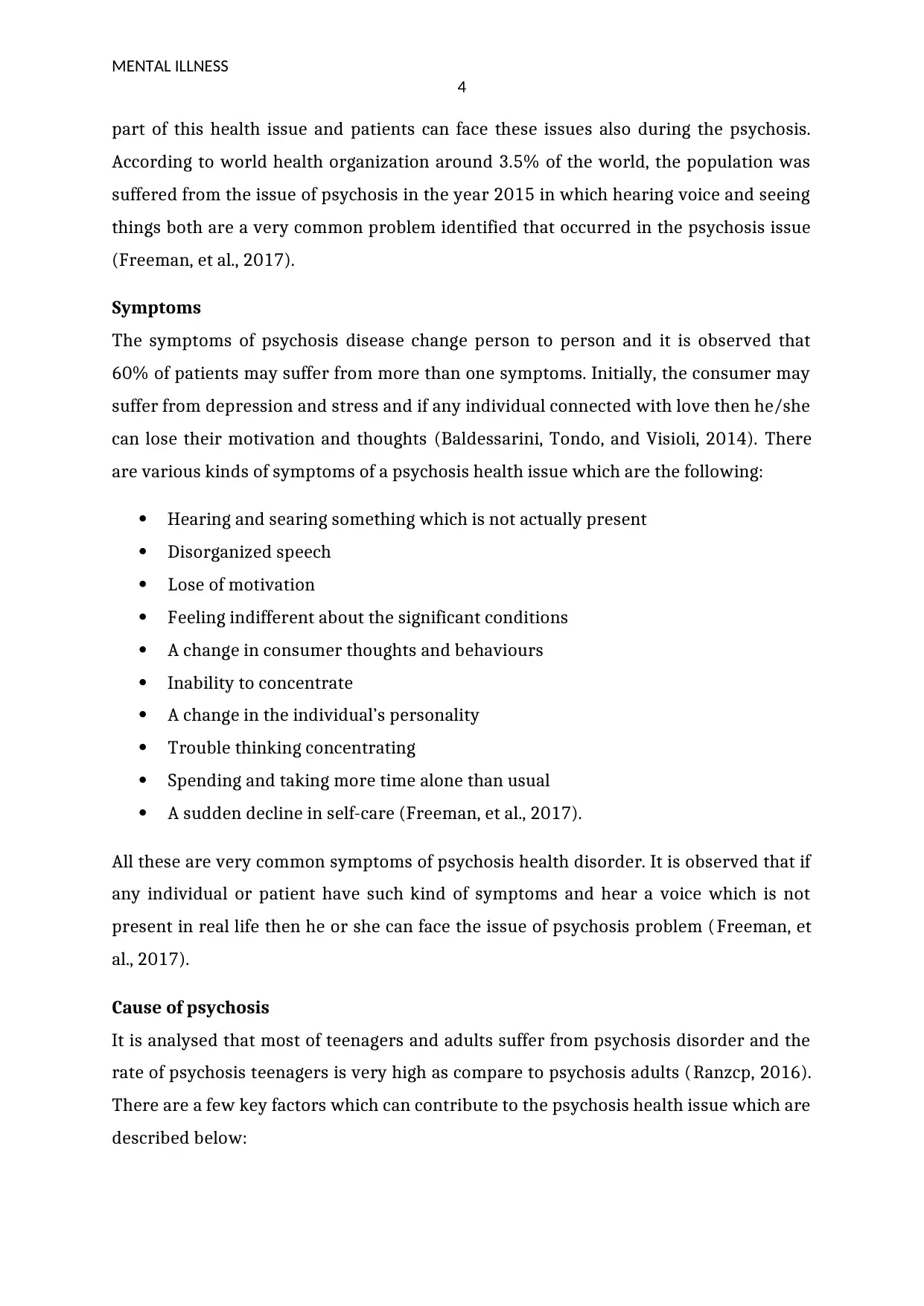
MENTAL ILLNESS
4
part of this health issue and patients can face these issues also during the psychosis.
According to world health organization around 3.5% of the world, the population was
suffered from the issue of psychosis in the year 2015 in which hearing voice and seeing
things both are a very common problem identified that occurred in the psychosis issue
(Freeman, et al., 2017).
Symptoms
The symptoms of psychosis disease change person to person and it is observed that
60% of patients may suffer from more than one symptoms. Initially, the consumer may
suffer from depression and stress and if any individual connected with love then he/she
can lose their motivation and thoughts (Baldessarini, Tondo, and Visioli, 2014). There
are various kinds of symptoms of a psychosis health issue which are the following:
Hearing and searing something which is not actually present
Disorganized speech
Lose of motivation
Feeling indifferent about the significant conditions
A change in consumer thoughts and behaviours
Inability to concentrate
A change in the individual’s personality
Trouble thinking concentrating
Spending and taking more time alone than usual
A sudden decline in self-care (Freeman, et al., 2017).
All these are very common symptoms of psychosis health disorder. It is observed that if
any individual or patient have such kind of symptoms and hear a voice which is not
present in real life then he or she can face the issue of psychosis problem (Freeman, et
al., 2017).
Cause of psychosis
It is analysed that most of teenagers and adults suffer from psychosis disorder and the
rate of psychosis teenagers is very high as compare to psychosis adults (Ranzcp, 2016).
There are a few key factors which can contribute to the psychosis health issue which are
described below:
4
part of this health issue and patients can face these issues also during the psychosis.
According to world health organization around 3.5% of the world, the population was
suffered from the issue of psychosis in the year 2015 in which hearing voice and seeing
things both are a very common problem identified that occurred in the psychosis issue
(Freeman, et al., 2017).
Symptoms
The symptoms of psychosis disease change person to person and it is observed that
60% of patients may suffer from more than one symptoms. Initially, the consumer may
suffer from depression and stress and if any individual connected with love then he/she
can lose their motivation and thoughts (Baldessarini, Tondo, and Visioli, 2014). There
are various kinds of symptoms of a psychosis health issue which are the following:
Hearing and searing something which is not actually present
Disorganized speech
Lose of motivation
Feeling indifferent about the significant conditions
A change in consumer thoughts and behaviours
Inability to concentrate
A change in the individual’s personality
Trouble thinking concentrating
Spending and taking more time alone than usual
A sudden decline in self-care (Freeman, et al., 2017).
All these are very common symptoms of psychosis health disorder. It is observed that if
any individual or patient have such kind of symptoms and hear a voice which is not
present in real life then he or she can face the issue of psychosis problem (Freeman, et
al., 2017).
Cause of psychosis
It is analysed that most of teenagers and adults suffer from psychosis disorder and the
rate of psychosis teenagers is very high as compare to psychosis adults (Ranzcp, 2016).
There are a few key factors which can contribute to the psychosis health issue which are
described below:
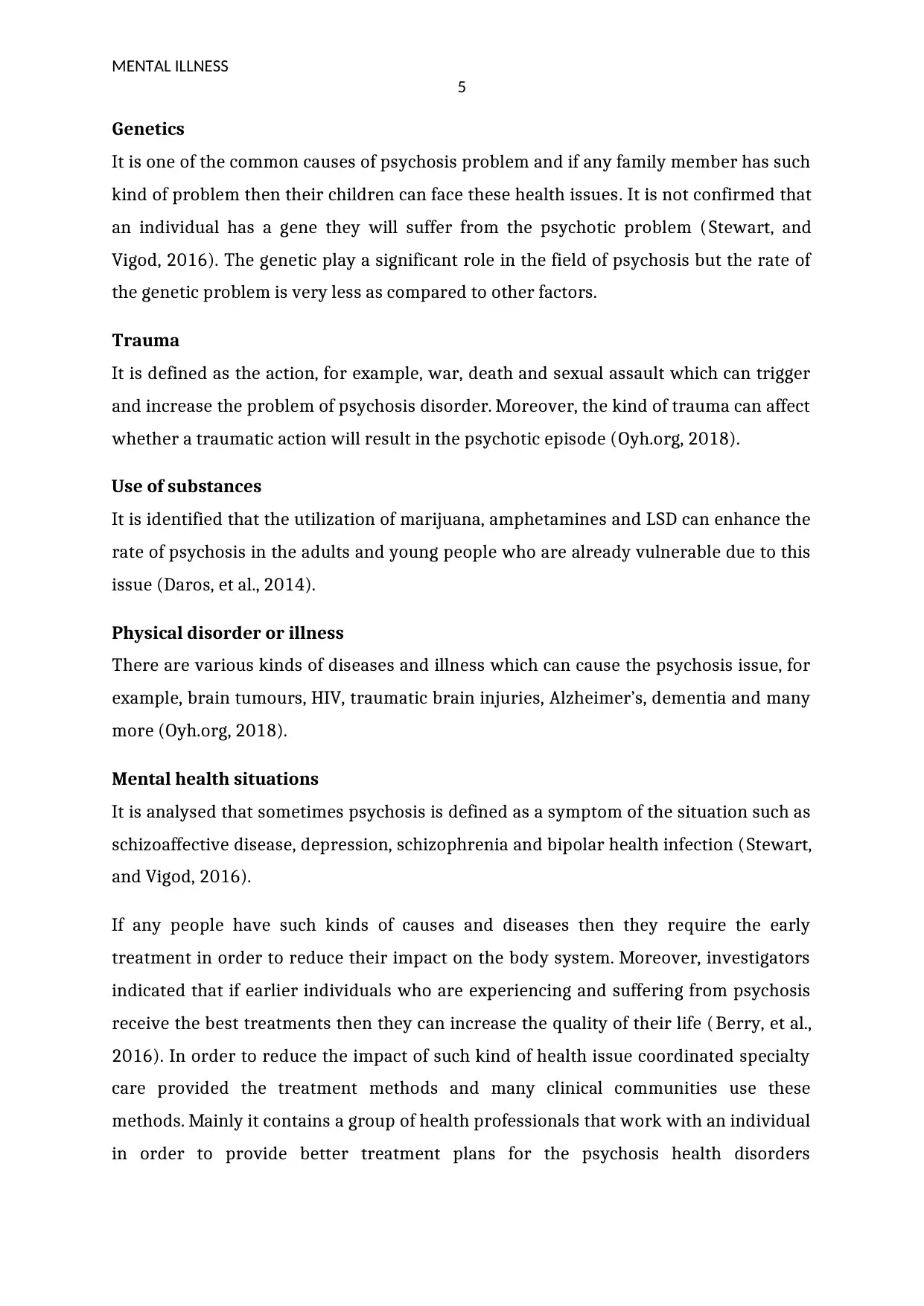
MENTAL ILLNESS
5
Genetics
It is one of the common causes of psychosis problem and if any family member has such
kind of problem then their children can face these health issues. It is not confirmed that
an individual has a gene they will suffer from the psychotic problem (Stewart, and
Vigod, 2016). The genetic play a significant role in the field of psychosis but the rate of
the genetic problem is very less as compared to other factors.
Trauma
It is defined as the action, for example, war, death and sexual assault which can trigger
and increase the problem of psychosis disorder. Moreover, the kind of trauma can affect
whether a traumatic action will result in the psychotic episode (Oyh.org, 2018).
Use of substances
It is identified that the utilization of marijuana, amphetamines and LSD can enhance the
rate of psychosis in the adults and young people who are already vulnerable due to this
issue (Daros, et al., 2014).
Physical disorder or illness
There are various kinds of diseases and illness which can cause the psychosis issue, for
example, brain tumours, HIV, traumatic brain injuries, Alzheimer’s, dementia and many
more (Oyh.org, 2018).
Mental health situations
It is analysed that sometimes psychosis is defined as a symptom of the situation such as
schizoaffective disease, depression, schizophrenia and bipolar health infection (Stewart,
and Vigod, 2016).
If any people have such kinds of causes and diseases then they require the early
treatment in order to reduce their impact on the body system. Moreover, investigators
indicated that if earlier individuals who are experiencing and suffering from psychosis
receive the best treatments then they can increase the quality of their life (Berry, et al.,
2016). In order to reduce the impact of such kind of health issue coordinated specialty
care provided the treatment methods and many clinical communities use these
methods. Mainly it contains a group of health professionals that work with an individual
in order to provide better treatment plans for the psychosis health disorders
5
Genetics
It is one of the common causes of psychosis problem and if any family member has such
kind of problem then their children can face these health issues. It is not confirmed that
an individual has a gene they will suffer from the psychotic problem (Stewart, and
Vigod, 2016). The genetic play a significant role in the field of psychosis but the rate of
the genetic problem is very less as compared to other factors.
Trauma
It is defined as the action, for example, war, death and sexual assault which can trigger
and increase the problem of psychosis disorder. Moreover, the kind of trauma can affect
whether a traumatic action will result in the psychotic episode (Oyh.org, 2018).
Use of substances
It is identified that the utilization of marijuana, amphetamines and LSD can enhance the
rate of psychosis in the adults and young people who are already vulnerable due to this
issue (Daros, et al., 2014).
Physical disorder or illness
There are various kinds of diseases and illness which can cause the psychosis issue, for
example, brain tumours, HIV, traumatic brain injuries, Alzheimer’s, dementia and many
more (Oyh.org, 2018).
Mental health situations
It is analysed that sometimes psychosis is defined as a symptom of the situation such as
schizoaffective disease, depression, schizophrenia and bipolar health infection (Stewart,
and Vigod, 2016).
If any people have such kinds of causes and diseases then they require the early
treatment in order to reduce their impact on the body system. Moreover, investigators
indicated that if earlier individuals who are experiencing and suffering from psychosis
receive the best treatments then they can increase the quality of their life (Berry, et al.,
2016). In order to reduce the impact of such kind of health issue coordinated specialty
care provided the treatment methods and many clinical communities use these
methods. Mainly it contains a group of health professionals that work with an individual
in order to provide better treatment plans for the psychosis health disorders
⊘ This is a preview!⊘
Do you want full access?
Subscribe today to unlock all pages.

Trusted by 1+ million students worldwide
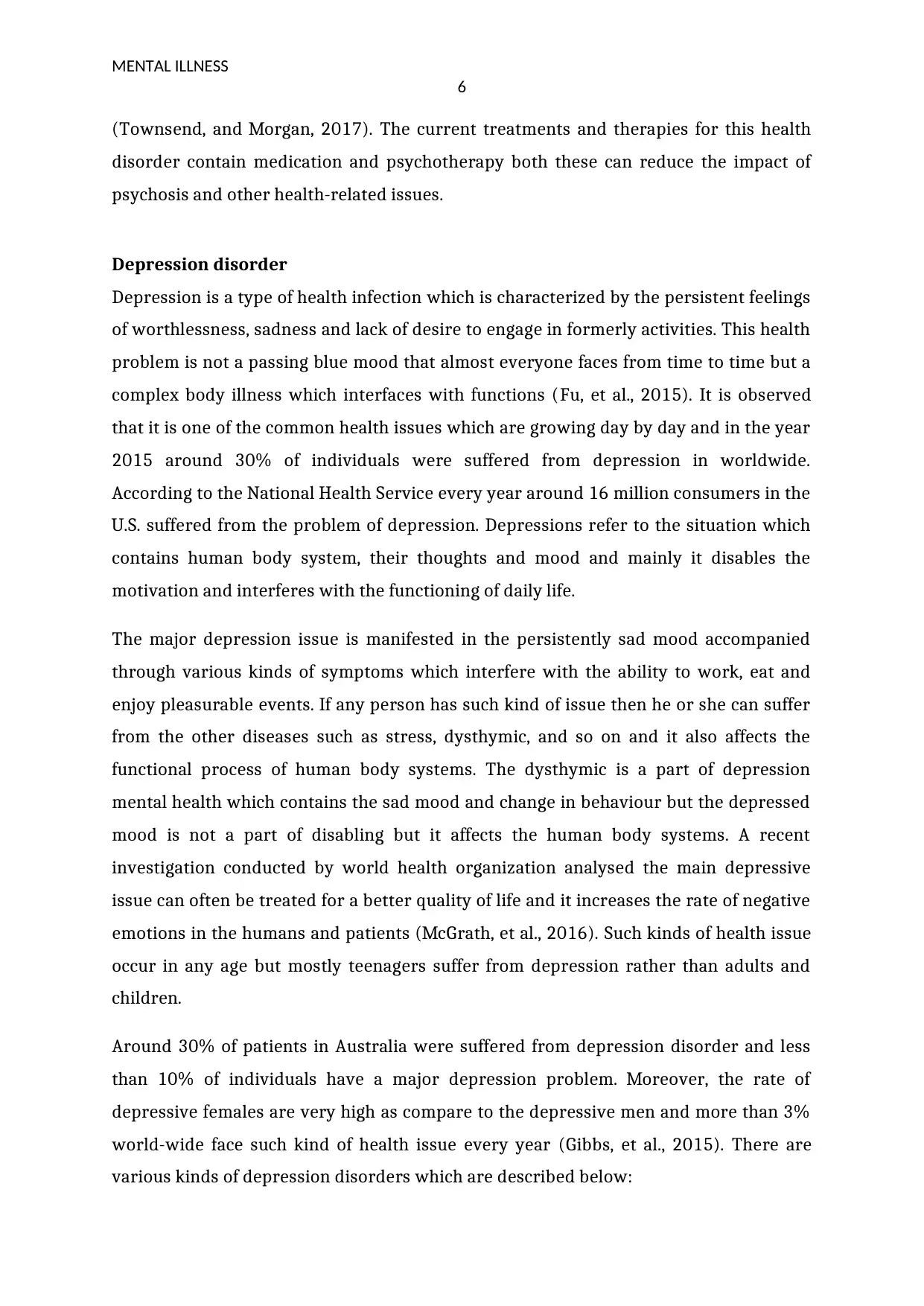
MENTAL ILLNESS
6
(Townsend, and Morgan, 2017). The current treatments and therapies for this health
disorder contain medication and psychotherapy both these can reduce the impact of
psychosis and other health-related issues.
Depression disorder
Depression is a type of health infection which is characterized by the persistent feelings
of worthlessness, sadness and lack of desire to engage in formerly activities. This health
problem is not a passing blue mood that almost everyone faces from time to time but a
complex body illness which interfaces with functions (Fu, et al., 2015). It is observed
that it is one of the common health issues which are growing day by day and in the year
2015 around 30% of individuals were suffered from depression in worldwide.
According to the National Health Service every year around 16 million consumers in the
U.S. suffered from the problem of depression. Depressions refer to the situation which
contains human body system, their thoughts and mood and mainly it disables the
motivation and interferes with the functioning of daily life.
The major depression issue is manifested in the persistently sad mood accompanied
through various kinds of symptoms which interfere with the ability to work, eat and
enjoy pleasurable events. If any person has such kind of issue then he or she can suffer
from the other diseases such as stress, dysthymic, and so on and it also affects the
functional process of human body systems. The dysthymic is a part of depression
mental health which contains the sad mood and change in behaviour but the depressed
mood is not a part of disabling but it affects the human body systems. A recent
investigation conducted by world health organization analysed the main depressive
issue can often be treated for a better quality of life and it increases the rate of negative
emotions in the humans and patients (McGrath, et al., 2016). Such kinds of health issue
occur in any age but mostly teenagers suffer from depression rather than adults and
children.
Around 30% of patients in Australia were suffered from depression disorder and less
than 10% of individuals have a major depression problem. Moreover, the rate of
depressive females are very high as compare to the depressive men and more than 3%
world-wide face such kind of health issue every year (Gibbs, et al., 2015). There are
various kinds of depression disorders which are described below:
6
(Townsend, and Morgan, 2017). The current treatments and therapies for this health
disorder contain medication and psychotherapy both these can reduce the impact of
psychosis and other health-related issues.
Depression disorder
Depression is a type of health infection which is characterized by the persistent feelings
of worthlessness, sadness and lack of desire to engage in formerly activities. This health
problem is not a passing blue mood that almost everyone faces from time to time but a
complex body illness which interfaces with functions (Fu, et al., 2015). It is observed
that it is one of the common health issues which are growing day by day and in the year
2015 around 30% of individuals were suffered from depression in worldwide.
According to the National Health Service every year around 16 million consumers in the
U.S. suffered from the problem of depression. Depressions refer to the situation which
contains human body system, their thoughts and mood and mainly it disables the
motivation and interferes with the functioning of daily life.
The major depression issue is manifested in the persistently sad mood accompanied
through various kinds of symptoms which interfere with the ability to work, eat and
enjoy pleasurable events. If any person has such kind of issue then he or she can suffer
from the other diseases such as stress, dysthymic, and so on and it also affects the
functional process of human body systems. The dysthymic is a part of depression
mental health which contains the sad mood and change in behaviour but the depressed
mood is not a part of disabling but it affects the human body systems. A recent
investigation conducted by world health organization analysed the main depressive
issue can often be treated for a better quality of life and it increases the rate of negative
emotions in the humans and patients (McGrath, et al., 2016). Such kinds of health issue
occur in any age but mostly teenagers suffer from depression rather than adults and
children.
Around 30% of patients in Australia were suffered from depression disorder and less
than 10% of individuals have a major depression problem. Moreover, the rate of
depressive females are very high as compare to the depressive men and more than 3%
world-wide face such kind of health issue every year (Gibbs, et al., 2015). There are
various kinds of depression disorders which are described below:
Paraphrase This Document
Need a fresh take? Get an instant paraphrase of this document with our AI Paraphraser
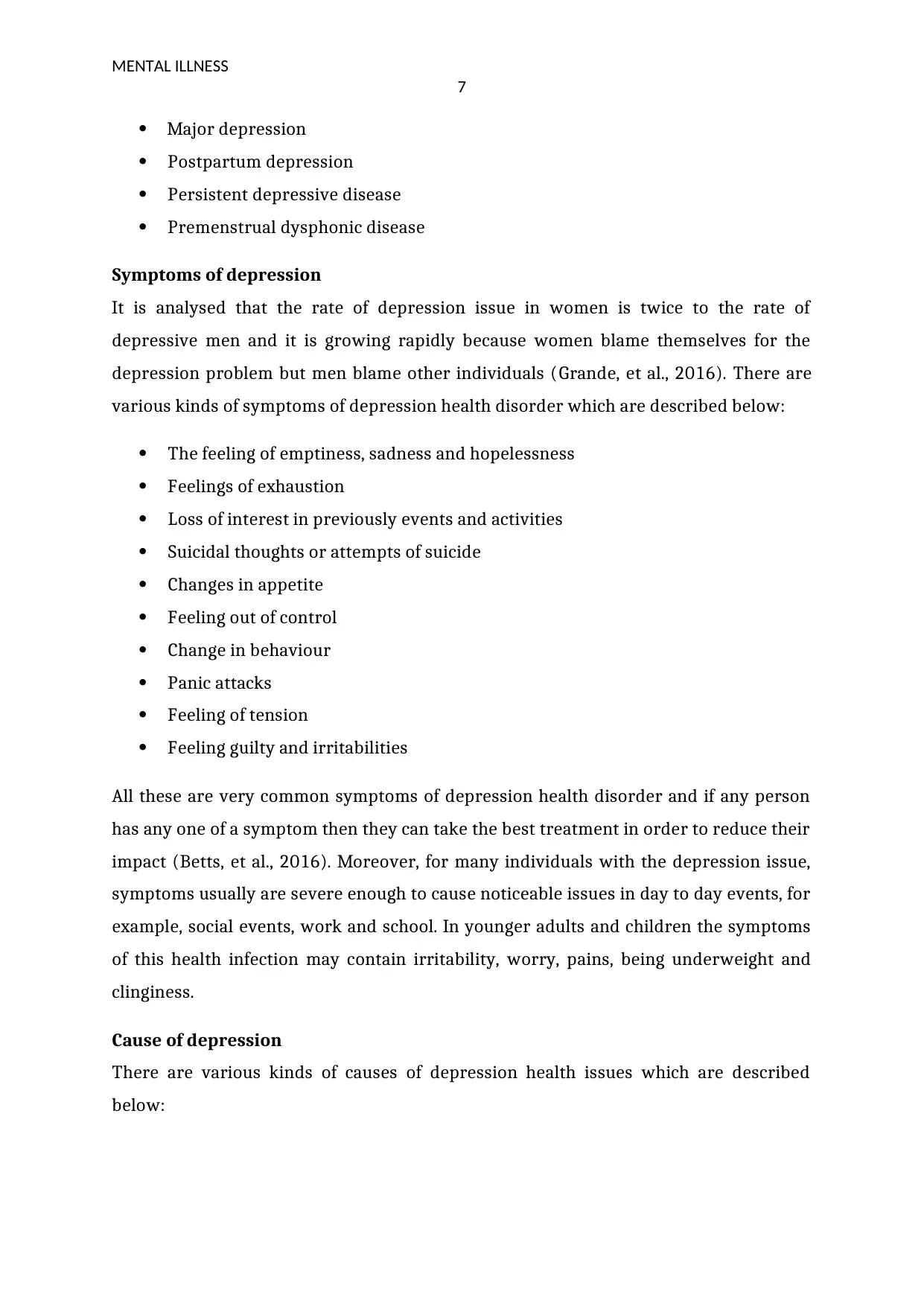
MENTAL ILLNESS
7
Major depression
Postpartum depression
Persistent depressive disease
Premenstrual dysphonic disease
Symptoms of depression
It is analysed that the rate of depression issue in women is twice to the rate of
depressive men and it is growing rapidly because women blame themselves for the
depression problem but men blame other individuals (Grande, et al., 2016). There are
various kinds of symptoms of depression health disorder which are described below:
The feeling of emptiness, sadness and hopelessness
Feelings of exhaustion
Loss of interest in previously events and activities
Suicidal thoughts or attempts of suicide
Changes in appetite
Feeling out of control
Change in behaviour
Panic attacks
Feeling of tension
Feeling guilty and irritabilities
All these are very common symptoms of depression health disorder and if any person
has any one of a symptom then they can take the best treatment in order to reduce their
impact (Betts, et al., 2016). Moreover, for many individuals with the depression issue,
symptoms usually are severe enough to cause noticeable issues in day to day events, for
example, social events, work and school. In younger adults and children the symptoms
of this health infection may contain irritability, worry, pains, being underweight and
clinginess.
Cause of depression
There are various kinds of causes of depression health issues which are described
below:
7
Major depression
Postpartum depression
Persistent depressive disease
Premenstrual dysphonic disease
Symptoms of depression
It is analysed that the rate of depression issue in women is twice to the rate of
depressive men and it is growing rapidly because women blame themselves for the
depression problem but men blame other individuals (Grande, et al., 2016). There are
various kinds of symptoms of depression health disorder which are described below:
The feeling of emptiness, sadness and hopelessness
Feelings of exhaustion
Loss of interest in previously events and activities
Suicidal thoughts or attempts of suicide
Changes in appetite
Feeling out of control
Change in behaviour
Panic attacks
Feeling of tension
Feeling guilty and irritabilities
All these are very common symptoms of depression health disorder and if any person
has any one of a symptom then they can take the best treatment in order to reduce their
impact (Betts, et al., 2016). Moreover, for many individuals with the depression issue,
symptoms usually are severe enough to cause noticeable issues in day to day events, for
example, social events, work and school. In younger adults and children the symptoms
of this health infection may contain irritability, worry, pains, being underweight and
clinginess.
Cause of depression
There are various kinds of causes of depression health issues which are described
below:
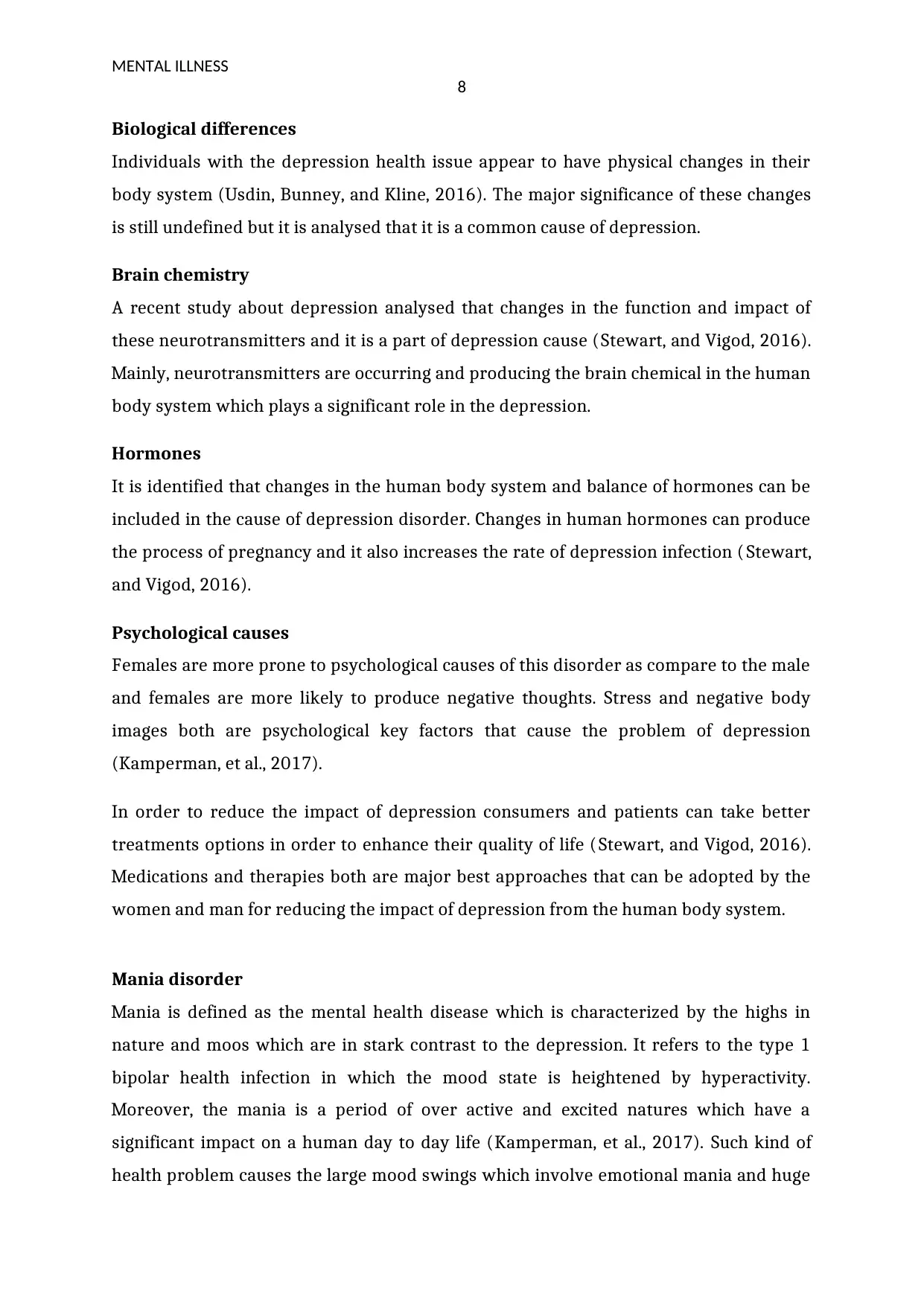
MENTAL ILLNESS
8
Biological differences
Individuals with the depression health issue appear to have physical changes in their
body system (Usdin, Bunney, and Kline, 2016). The major significance of these changes
is still undefined but it is analysed that it is a common cause of depression.
Brain chemistry
A recent study about depression analysed that changes in the function and impact of
these neurotransmitters and it is a part of depression cause (Stewart, and Vigod, 2016).
Mainly, neurotransmitters are occurring and producing the brain chemical in the human
body system which plays a significant role in the depression.
Hormones
It is identified that changes in the human body system and balance of hormones can be
included in the cause of depression disorder. Changes in human hormones can produce
the process of pregnancy and it also increases the rate of depression infection (Stewart,
and Vigod, 2016).
Psychological causes
Females are more prone to psychological causes of this disorder as compare to the male
and females are more likely to produce negative thoughts. Stress and negative body
images both are psychological key factors that cause the problem of depression
(Kamperman, et al., 2017).
In order to reduce the impact of depression consumers and patients can take better
treatments options in order to enhance their quality of life (Stewart, and Vigod, 2016).
Medications and therapies both are major best approaches that can be adopted by the
women and man for reducing the impact of depression from the human body system.
Mania disorder
Mania is defined as the mental health disease which is characterized by the highs in
nature and moos which are in stark contrast to the depression. It refers to the type 1
bipolar health infection in which the mood state is heightened by hyperactivity.
Moreover, the mania is a period of over active and excited natures which have a
significant impact on a human day to day life (Kamperman, et al., 2017). Such kind of
health problem causes the large mood swings which involve emotional mania and huge
8
Biological differences
Individuals with the depression health issue appear to have physical changes in their
body system (Usdin, Bunney, and Kline, 2016). The major significance of these changes
is still undefined but it is analysed that it is a common cause of depression.
Brain chemistry
A recent study about depression analysed that changes in the function and impact of
these neurotransmitters and it is a part of depression cause (Stewart, and Vigod, 2016).
Mainly, neurotransmitters are occurring and producing the brain chemical in the human
body system which plays a significant role in the depression.
Hormones
It is identified that changes in the human body system and balance of hormones can be
included in the cause of depression disorder. Changes in human hormones can produce
the process of pregnancy and it also increases the rate of depression infection (Stewart,
and Vigod, 2016).
Psychological causes
Females are more prone to psychological causes of this disorder as compare to the male
and females are more likely to produce negative thoughts. Stress and negative body
images both are psychological key factors that cause the problem of depression
(Kamperman, et al., 2017).
In order to reduce the impact of depression consumers and patients can take better
treatments options in order to enhance their quality of life (Stewart, and Vigod, 2016).
Medications and therapies both are major best approaches that can be adopted by the
women and man for reducing the impact of depression from the human body system.
Mania disorder
Mania is defined as the mental health disease which is characterized by the highs in
nature and moos which are in stark contrast to the depression. It refers to the type 1
bipolar health infection in which the mood state is heightened by hyperactivity.
Moreover, the mania is a period of over active and excited natures which have a
significant impact on a human day to day life (Kamperman, et al., 2017). Such kind of
health problem causes the large mood swings which involve emotional mania and huge
⊘ This is a preview!⊘
Do you want full access?
Subscribe today to unlock all pages.

Trusted by 1+ million students worldwide
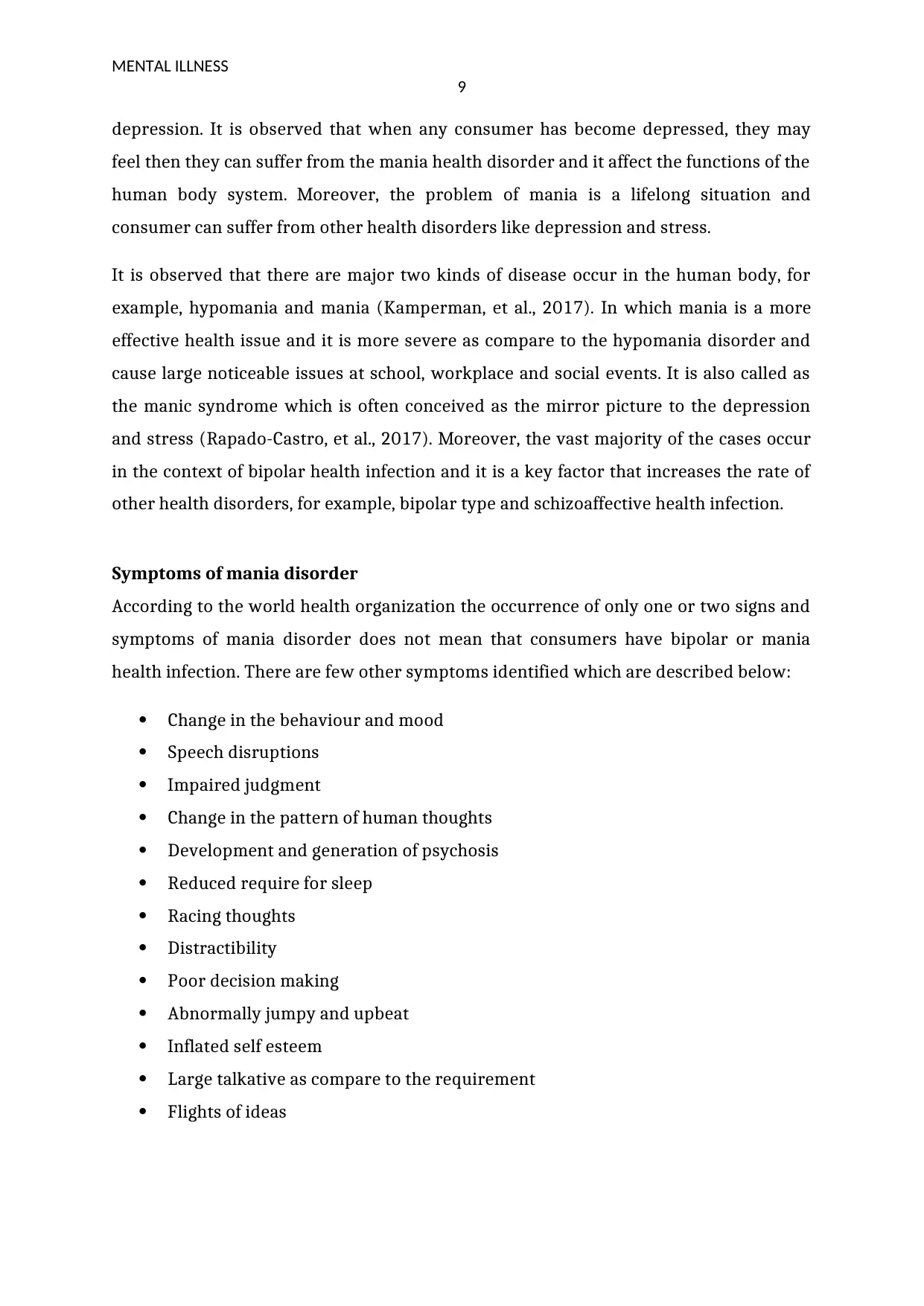
MENTAL ILLNESS
9
depression. It is observed that when any consumer has become depressed, they may
feel then they can suffer from the mania health disorder and it affect the functions of the
human body system. Moreover, the problem of mania is a lifelong situation and
consumer can suffer from other health disorders like depression and stress.
It is observed that there are major two kinds of disease occur in the human body, for
example, hypomania and mania (Kamperman, et al., 2017). In which mania is a more
effective health issue and it is more severe as compare to the hypomania disorder and
cause large noticeable issues at school, workplace and social events. It is also called as
the manic syndrome which is often conceived as the mirror picture to the depression
and stress (Rapado-Castro, et al., 2017). Moreover, the vast majority of the cases occur
in the context of bipolar health infection and it is a key factor that increases the rate of
other health disorders, for example, bipolar type and schizoaffective health infection.
Symptoms of mania disorder
According to the world health organization the occurrence of only one or two signs and
symptoms of mania disorder does not mean that consumers have bipolar or mania
health infection. There are few other symptoms identified which are described below:
Change in the behaviour and mood
Speech disruptions
Impaired judgment
Change in the pattern of human thoughts
Development and generation of psychosis
Reduced require for sleep
Racing thoughts
Distractibility
Poor decision making
Abnormally jumpy and upbeat
Inflated self esteem
Large talkative as compare to the requirement
Flights of ideas
9
depression. It is observed that when any consumer has become depressed, they may
feel then they can suffer from the mania health disorder and it affect the functions of the
human body system. Moreover, the problem of mania is a lifelong situation and
consumer can suffer from other health disorders like depression and stress.
It is observed that there are major two kinds of disease occur in the human body, for
example, hypomania and mania (Kamperman, et al., 2017). In which mania is a more
effective health issue and it is more severe as compare to the hypomania disorder and
cause large noticeable issues at school, workplace and social events. It is also called as
the manic syndrome which is often conceived as the mirror picture to the depression
and stress (Rapado-Castro, et al., 2017). Moreover, the vast majority of the cases occur
in the context of bipolar health infection and it is a key factor that increases the rate of
other health disorders, for example, bipolar type and schizoaffective health infection.
Symptoms of mania disorder
According to the world health organization the occurrence of only one or two signs and
symptoms of mania disorder does not mean that consumers have bipolar or mania
health infection. There are few other symptoms identified which are described below:
Change in the behaviour and mood
Speech disruptions
Impaired judgment
Change in the pattern of human thoughts
Development and generation of psychosis
Reduced require for sleep
Racing thoughts
Distractibility
Poor decision making
Abnormally jumpy and upbeat
Inflated self esteem
Large talkative as compare to the requirement
Flights of ideas
Paraphrase This Document
Need a fresh take? Get an instant paraphrase of this document with our AI Paraphraser
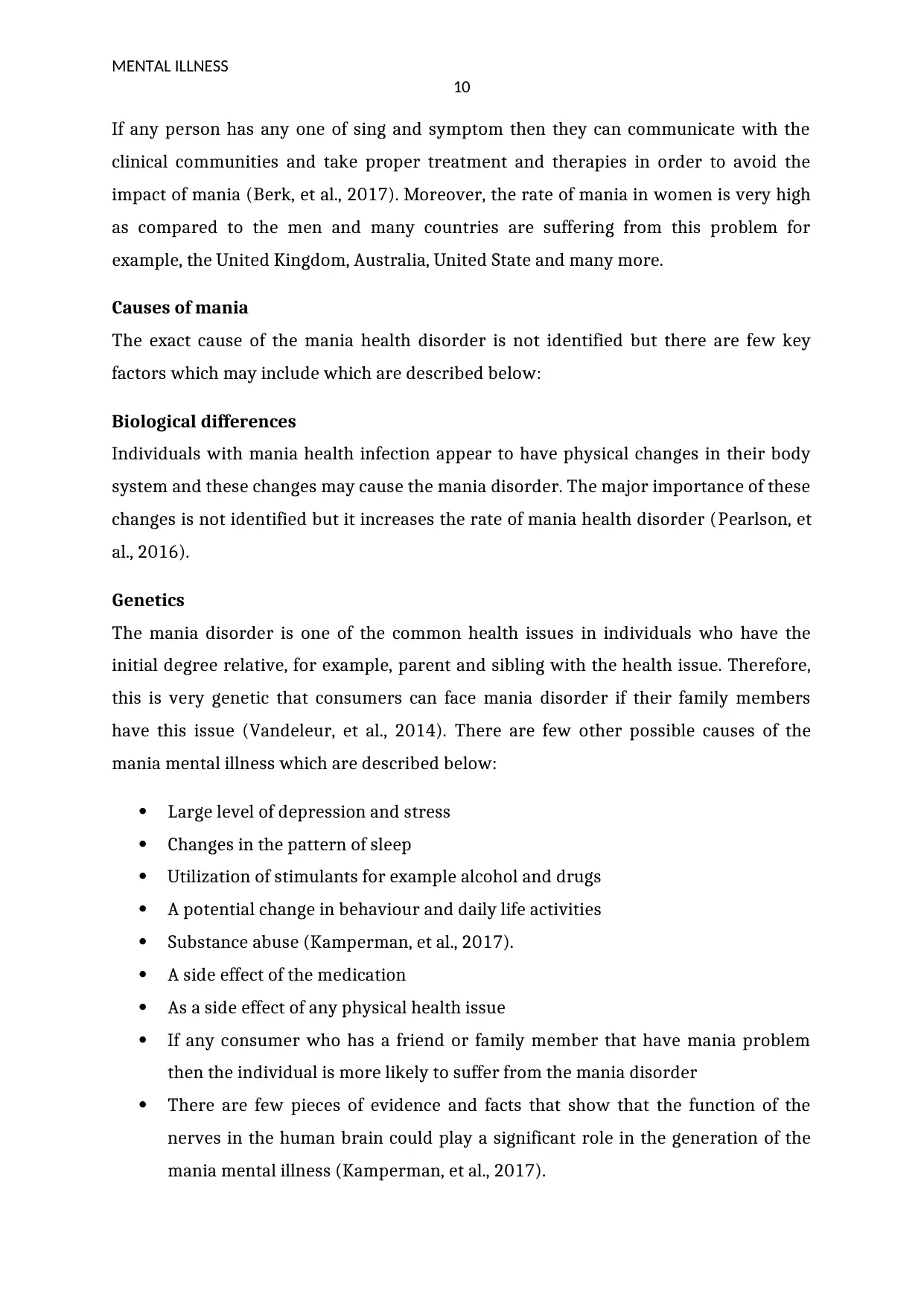
MENTAL ILLNESS
10
If any person has any one of sing and symptom then they can communicate with the
clinical communities and take proper treatment and therapies in order to avoid the
impact of mania (Berk, et al., 2017). Moreover, the rate of mania in women is very high
as compared to the men and many countries are suffering from this problem for
example, the United Kingdom, Australia, United State and many more.
Causes of mania
The exact cause of the mania health disorder is not identified but there are few key
factors which may include which are described below:
Biological differences
Individuals with mania health infection appear to have physical changes in their body
system and these changes may cause the mania disorder. The major importance of these
changes is not identified but it increases the rate of mania health disorder (Pearlson, et
al., 2016).
Genetics
The mania disorder is one of the common health issues in individuals who have the
initial degree relative, for example, parent and sibling with the health issue. Therefore,
this is very genetic that consumers can face mania disorder if their family members
have this issue (Vandeleur, et al., 2014). There are few other possible causes of the
mania mental illness which are described below:
Large level of depression and stress
Changes in the pattern of sleep
Utilization of stimulants for example alcohol and drugs
A potential change in behaviour and daily life activities
Substance abuse (Kamperman, et al., 2017).
A side effect of the medication
As a side effect of any physical health issue
If any consumer who has a friend or family member that have mania problem
then the individual is more likely to suffer from the mania disorder
There are few pieces of evidence and facts that show that the function of the
nerves in the human brain could play a significant role in the generation of the
mania mental illness (Kamperman, et al., 2017).
10
If any person has any one of sing and symptom then they can communicate with the
clinical communities and take proper treatment and therapies in order to avoid the
impact of mania (Berk, et al., 2017). Moreover, the rate of mania in women is very high
as compared to the men and many countries are suffering from this problem for
example, the United Kingdom, Australia, United State and many more.
Causes of mania
The exact cause of the mania health disorder is not identified but there are few key
factors which may include which are described below:
Biological differences
Individuals with mania health infection appear to have physical changes in their body
system and these changes may cause the mania disorder. The major importance of these
changes is not identified but it increases the rate of mania health disorder (Pearlson, et
al., 2016).
Genetics
The mania disorder is one of the common health issues in individuals who have the
initial degree relative, for example, parent and sibling with the health issue. Therefore,
this is very genetic that consumers can face mania disorder if their family members
have this issue (Vandeleur, et al., 2014). There are few other possible causes of the
mania mental illness which are described below:
Large level of depression and stress
Changes in the pattern of sleep
Utilization of stimulants for example alcohol and drugs
A potential change in behaviour and daily life activities
Substance abuse (Kamperman, et al., 2017).
A side effect of the medication
As a side effect of any physical health issue
If any consumer who has a friend or family member that have mania problem
then the individual is more likely to suffer from the mania disorder
There are few pieces of evidence and facts that show that the function of the
nerves in the human brain could play a significant role in the generation of the
mania mental illness (Kamperman, et al., 2017).
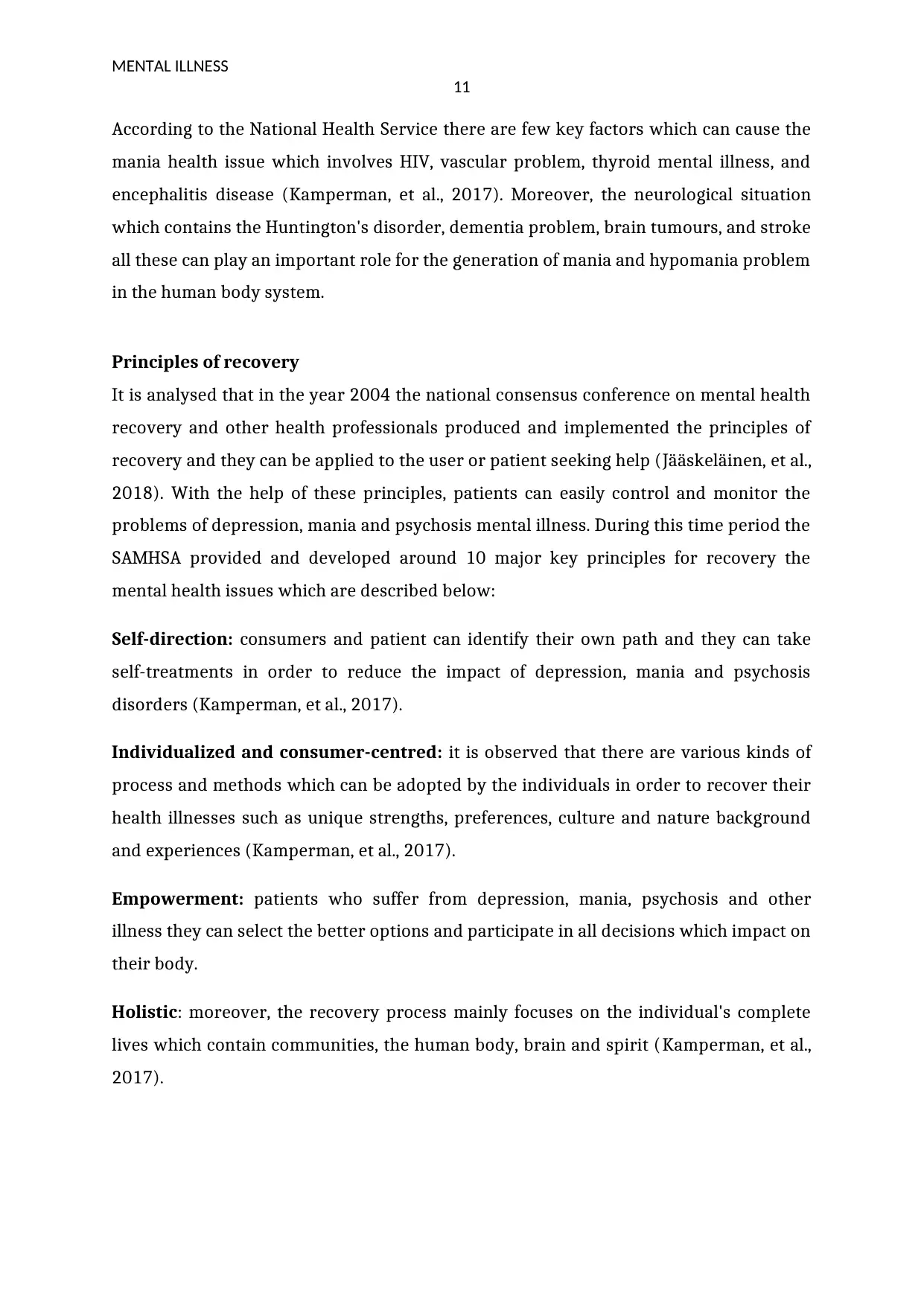
MENTAL ILLNESS
11
According to the National Health Service there are few key factors which can cause the
mania health issue which involves HIV, vascular problem, thyroid mental illness, and
encephalitis disease (Kamperman, et al., 2017). Moreover, the neurological situation
which contains the Huntington's disorder, dementia problem, brain tumours, and stroke
all these can play an important role for the generation of mania and hypomania problem
in the human body system.
Principles of recovery
It is analysed that in the year 2004 the national consensus conference on mental health
recovery and other health professionals produced and implemented the principles of
recovery and they can be applied to the user or patient seeking help (Jääskeläinen, et al.,
2018). With the help of these principles, patients can easily control and monitor the
problems of depression, mania and psychosis mental illness. During this time period the
SAMHSA provided and developed around 10 major key principles for recovery the
mental health issues which are described below:
Self-direction: consumers and patient can identify their own path and they can take
self-treatments in order to reduce the impact of depression, mania and psychosis
disorders (Kamperman, et al., 2017).
Individualized and consumer-centred: it is observed that there are various kinds of
process and methods which can be adopted by the individuals in order to recover their
health illnesses such as unique strengths, preferences, culture and nature background
and experiences (Kamperman, et al., 2017).
Empowerment: patients who suffer from depression, mania, psychosis and other
illness they can select the better options and participate in all decisions which impact on
their body.
Holistic: moreover, the recovery process mainly focuses on the individual's complete
lives which contain communities, the human body, brain and spirit (Kamperman, et al.,
2017).
11
According to the National Health Service there are few key factors which can cause the
mania health issue which involves HIV, vascular problem, thyroid mental illness, and
encephalitis disease (Kamperman, et al., 2017). Moreover, the neurological situation
which contains the Huntington's disorder, dementia problem, brain tumours, and stroke
all these can play an important role for the generation of mania and hypomania problem
in the human body system.
Principles of recovery
It is analysed that in the year 2004 the national consensus conference on mental health
recovery and other health professionals produced and implemented the principles of
recovery and they can be applied to the user or patient seeking help (Jääskeläinen, et al.,
2018). With the help of these principles, patients can easily control and monitor the
problems of depression, mania and psychosis mental illness. During this time period the
SAMHSA provided and developed around 10 major key principles for recovery the
mental health issues which are described below:
Self-direction: consumers and patient can identify their own path and they can take
self-treatments in order to reduce the impact of depression, mania and psychosis
disorders (Kamperman, et al., 2017).
Individualized and consumer-centred: it is observed that there are various kinds of
process and methods which can be adopted by the individuals in order to recover their
health illnesses such as unique strengths, preferences, culture and nature background
and experiences (Kamperman, et al., 2017).
Empowerment: patients who suffer from depression, mania, psychosis and other
illness they can select the better options and participate in all decisions which impact on
their body.
Holistic: moreover, the recovery process mainly focuses on the individual's complete
lives which contain communities, the human body, brain and spirit (Kamperman, et al.,
2017).
⊘ This is a preview!⊘
Do you want full access?
Subscribe today to unlock all pages.

Trusted by 1+ million students worldwide
1 out of 20
Related Documents
Your All-in-One AI-Powered Toolkit for Academic Success.
+13062052269
info@desklib.com
Available 24*7 on WhatsApp / Email
![[object Object]](/_next/static/media/star-bottom.7253800d.svg)
Unlock your academic potential
Copyright © 2020–2026 A2Z Services. All Rights Reserved. Developed and managed by ZUCOL.





